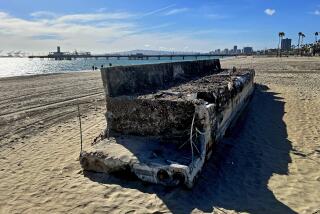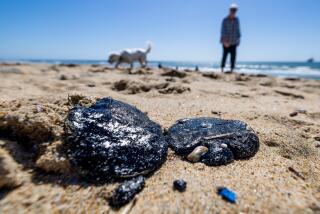Finding Some Hope Beneath All That Goo
- Share via
Let me go back a couple of days, to the first morning after the spill. There was a group of us, mostly folks from Huntington Beach, all standing around the pier. We were waiting for the slick.
In the parking lot the satellite trucks were parked fender-to-fender, and up in the sky I counted nine TV helicopters. They were waiting for the slick, too, until someone spotted a whale offshore, plowing through the goo. The choppers swarmed over the whale and beamed his image back to the television trucks, which shot the image to geostationary satellites, which relayed it to the networks in New York, which then broadcast the whale worldwide.
We watched this, and took it in stride. Just as we took in stride the airplane that trailed a banner reading, “Valdez was enough,” and the politicians who spent the morning holding press conferences on the sand. The morning news shows had correspondents posted at the high-tide line, giving surf updates every few minutes--”We can’t see the slick yet, Bryant”--and that didn’t surprise us either.
In fact, it was oddly satisfying. After all, this was no Podunk Prince William Sound. This was our spill, this was Southern California, and we weren’t talking about some oil-soaked fiord in Alaska. We were talking about The Beach.
There is an arrogance and irony about this at the same time. In Southern California we live in a soup of filth. The air is a health hazard, the water laced with heavy metals, the streets menacing and dangerous. We’re famous for it. I have a friend who was thinking about all this as she watched some television coverage of the spill. When it was over she turned to me with a smile and said, “Just one more stain on the whorehouse sheet.”
And she’s right, of course. If you stand next to the Huntington Beach Pier and really look at this place, you will see the hard truth. Huntington Beach smelled of crude oil before the American Trader ever disgorged its cargo into the sea. All over downtown, a hundred oil wells pump day and night in the heart of the city, and just offshore the platform rigs are pulling crude out of the continental shelf. Catching a whiff of petroleum products on the morning breeze is one way of knowing you’re in Huntington Beach.
I don’t submit this to diminish the gravity of the spill itself. I am simply suggesting that, metaphorically speaking, we have come to live in an environmental whorehouse here in Southern California. We have accepted it and become blind to it, and our passionate defense of the beach carries with it the aforementioned irony. We haven’t defended much else.
On the second morning of the spill, after the slick had hit, I turned on the morning news and watched the Huntington Beach people dabbing at the brown mousse with little towels. An air of disbelief and rage pervaded the scene. One woman, her hands smeared with North Slope light, looked into the camera and said, “Crude oil doesn’t belong in Huntington Beach.”
What she meant was, “crude oil doesn’t belong on the Huntington Beach beach .” She had gone blind to the downtown wells and the offshore rigs, had chosen not to see them anymore. She probably stopped seeing them a long time ago and concentrated instead on the pure, white beach. To her, Huntington Beach was composed only of sand and the blue Pacific.
In one sense, it’s encouraging that the beach has this power over us. I suppose every region chooses some place that must be protected at all costs. Certainly, this seems to be ours. Go ahead and destroy the air and water, leave the freeways dysfunctional, just don’t mess with The Beach.
You can see this power reflected on people’s faces here. They stand next to PCH and watch the brown semicircles of crude left on the sand when the waves recede. They have a stricken look, as if the last place of refuge has been taken away.
And it has, temporarily at least. We’ve been lucky in some ways because this spill, in reality, is no Exxon Valdez and the beach will recover far more quickly than Alaska’s fiords. But the goo will stay on the beach long enough for the pain to sink in, to remind us how little is left of our heritage here in Southern California.
Maybe that’s the silver lining. If we can muster outrage over the loss of something as valuable as the beach, maybe we can manage a little rage for other losses as well.
More to Read
Sign up for Essential California
The most important California stories and recommendations in your inbox every morning.
You may occasionally receive promotional content from the Los Angeles Times.










